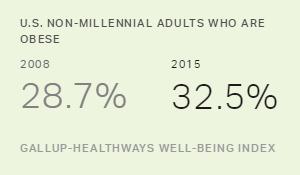Religious Americans are healthier and happier than those who are not religious. This finding is important because it potentially connects with one of the major social and economic problems of our time -- a hugely expensive healthcare system with costs that reflect in part the nation's unhealthy lifestyle choices. Religious Americans exhibit more of the types of behaviors that those interested in the health and well-being of the nation want to encourage. If Americans were to become more religious, it is quite possible they would be happier and healthier, and the cost of healthcare in this country would decline.
It's a reasonable, although not totally proven assumption, that becoming religious may lead to better health.
The explanations for this relationship are not yet fully understood. It's fairly clear that becoming religious may cause people to be happier and to feel better. And it's a reasonable, although not totally proven assumption, that becoming religious may lead to better health.
Despite the enduring controversy that usually surrounds matters of religion and public policy, those entrusted with improving well-being and health outcomes and lowering health costs will eventually have to focus on taking advantage of the widely confirmed religion-health connection. Average Americans, seeking ways to improve their health and well-being, may also increasingly turn to religion for these same reasons. The apparent power of religion to help achieve one of the nation's most important social and fiscal goals -- increasing well-being and lowering healthcare costs -- will be too significant to ignore.
Highly religious employees will cost a company less over time
This is where business and government come in -- albeit controversially. Both entities want Americans to lose weight, exercise, stop smoking, and engage in other healthy behaviors. This is based on the proven connection between these changes and a lowered cost burden on the healthcare system. Indeed, businesses and insurance companies increasingly use incentive systems designed to reward activities related to less use of healthcare dollars -- exercise, smoking cessation, and regular preventative health screenings.
Here's the controversial premise: Religion could be included in this list of behaviors. The basis for this would be an assumption that highly religious employees will cost a company less over time. Businesses could provide health insurance discounts to employees who demonstrate that they go to church -- similar to the programs now in place for other healthy lifestyle practices like going to the gym. The idea would be to sustain religious involvement among those who are already religious or to foster an increase in religious involvement among those who are not religious. This would lead to healthier employees and not incidentally, lower an organization's overall health costs.
I know of a hospital that stopped hiring smokers in 2007. It also gives incentives for participation in exercise programs, gives big discounts for developing healthy living plans if the employee is overweight or has other signs of pending excessive use of healthcare dollars, and has banned unhealthy foods from its cafeterias. I don't believe that this hospital yet gives incentives to its employees who are highly religious. But this could in theory be just around the corner.
The federal government, including Congress and the executive branch, are now the prime movers in the attempt to lower overall healthcare costs. Of course, the government cannot constitutionally get involved in promoting any specific religion, even if for socially desirable reasons.
The federal government does, however, provide information to its citizens, which in turn they can use to make healthier decisions. The government has mandated that tobacco products carry large warning labels about the deleterious effects of using them; has spent a great deal of effort to require that food packages list ingredients and contents; promotes various easy-to-use representations of food groups and their place in a healthy diet; and under the aegis of its health branches, publishes an enormous amount of data about the health effects of various behaviors and lifestyle choices.
Positive effects of religion are too strong to ignore
I remember the major emphasis that the Kennedy administration put on physical fitness, including promoting the 50-mile hike. First lady Michelle Obama more recently has become involved in a major effort to promote fitness and weight loss among the nation's young people. New York City Mayor Michael Bloomberg required chain restaurants in his city to carry dietary labels, and most recently, mandated a ban on the sale of large sodas in certain businesses in his city. (A New York state judge invalidated the ban; the city plans to appeal.) The Affordable Care Act of 2010 included a big section focused on increasing the healthiness of Americans before they are ever exposed to the healthcare system. So in theory, the U.S. government certainly could include information about the proven connection between religiousness in general (not mentioning any specific religion) and well-being and health in its communication efforts.
All of this is highly controversial. Many people recoil at the idea of business and government encouraging any type of religion or dealing with religion in any way. Religion is a touchy subject. Still, I think the positive effects of religion are too strong and too universal to ignore, especially when billions of dollars are at stake. I believe there is the real potential that those with a big financial interest in the well-being and health of the nation's population are going to have to talk directly and deeply about religion.
